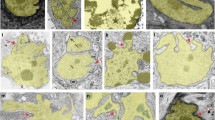Abstract
The effect of the mast v40 mutation was studied using neural ganglion cells of third-instar larvae of Drosophila melanogaster. The distributions of the cells by the interphase nucleus diameter and by the distance between the sister chromosome sets in anaphase were analyzed. Three following types of defects induced by the mutation were described: (1) Monopolar mitosis or, in the case of bipolar mitosis, an abnormally short distance between the sister chromosome sets in anaphase and early telophase. We suppose that these abnormalities are caused by damage of the start and (or) motor mechanisms of centrosome separation at the beginning and in the end of mitosis. (2) Lagging and bridging of chromosomes in anaphase and early telophase. These defects seem to be related to the disruption of functioning of mitotic spindle microtubules and (or) their defective attachment to the appropriate kinetochores. (3) Unlimited division of aneuploid and polyploid cells, which may be explained either by inactivation of the checkpoint system controlling the genome ploidy or by checkpoint adaptation. Taken collectively, our results and literature data suggest that the MAST protein is an element of the checkpoint system and that division of aneuploid and polyploid cells results from inactivation of the checkpoints.
Similar content being viewed by others
REFERENCES
Murray, A.W., Creative Blocks: Cell-Cycle Checkpoints and Feedback Control, Nature, 1992, vol. 359, pp. 599-604.
Clarke, D.J. and Gimenez-Abian, J.F., Checkpoints Controlling Mitosis, BioEssays, 2000, vol. 22, pp. 351-363.
Hayashi, S., A Cdc2-Dependent Checkpoint Maintains Diploidy in Drosophila, Development (Cambridge, UK), 1996, vol. 122, pp. 1051-1058.
Levine, D.S., Sancherz, C.A., Rabinovitch, P.S., and Reid, B.J., Formation of Tetraploid Intermediate Is Associated with the Development of Cells with More Than Four Centrioles in the elastase-simian virus 40 Tumor Antigen Transgenic Mouse Model of Pancreatic Cancer, Proc. Natl. Acad. Sci. USA, 1991, vol. 88, pp. 6427-6431.
Levine, A.J., p53, the Cellular Gatekeeper for Growth and Division, Cell (Cambridge, Mass.), 1997, vol. 88, pp. 323-331.
Pihan, G.A. and Doxey, S.J., The Mitotic Machinery as a Source of Genetic Instability in Cancer, Semin. Cancer Biol., 1999, vol. 9, pp. 289-302.
Omelyanchuk, L.V., Volkova, E.I., and Fedorova, S.A., Characterization of Insertion Mutations Leading to Mitosis Abnormalities in Drosophila melanogaster by Means of the Reporter Gene-Containing Transposon, Genetika (Moscow), 1997, vol. 33,no. 11, pp. 1494-1501.
Lemos, C.L., Sampaio, P., Maiato, H., et al., Mast, a Conserved Microtubule-Associated Protein Required for Centrosome Separation and Organization of the Mitotic Apparatus, EMBO J., 2000, vol. 19, pp. 3668-3682.
Inoue, Y.H., Mathe, E., Avides, C., et al., Orbit, a Novel Microtubule-Associated Protein Essential for Mitosis in Drosophila melanogaster, J. Cell Biol., 2000, vol. 149, pp. 153-165.
Maiato, H., Sampaio, P., Lemos, C.L., et al., MAST/Orbit Has a Role in Microtubule-Kinetochore Attachment and Is Essential for Chromosome Alignment and Maintenance of Spindle Bipolarity, J. Cell Biol., 2002, vol. 157,no. 5, pp. 749-760.
Lebedeva, L.I., Trunova, S.A., and Omelyanchuk, L.V., Genetic Control of Mitosis. Adaptive Modifications of v158 Mutation Expression, Genetika (Moscow), 2000, vol. 36,no. 10, pp. 1348-1354.
Lebedeva, L.I., Fedorova, S.A., and Omelyanchuk, L.V., Genetic Control of Mitosis: Mutation ff3 Causes Premature Beginning of Telophase Chromatin Reorganization in Drosophila melanogaster, Genetika (Moscow), 2003, vol. 39,no. 7, pp. 939-946.
Lebedeva, L.I., Trunova, S.A., Fedorova, S.A., and Omelyanchuk, L.V., Genetic Control of Mitosis: Features of Anaphase Separation of Sister Chromatid Sets in Mutant Strain aar v158 in Drosophila melanogaster, Genetika (Moscow), 2003, vol. 39,no. 9, pp. 1212-1220.
Waters, J.C., Cole, R.W., and Rieder, C.L., The Force-Producing Mechanism for Centrosome Separation during Spindle Formation in Vertebrates Is Intrinsic to Each Aster, J. Cell Biol., 1993, vol. 122, pp. 361-372.
Gonzales, C., Casal, J., and Ripoll, P., Functional Monopolar Spindles Caused by Mutation in mgr, a Cell Division Gene of Drosophila melanogaster, J. Cell Sci., 1988, vol. 89, pp. 39-47.
Glover, D.M., Leibowitz, M.H., McLean, D.A., and Parry, H., Mutations in aurora Prevent Centrosome Separation Leading to the Formation of the Monopolar Spindles, Cell (Cambridge, Mass.), 1995, vol. 81, pp. 95-106.
Sullivan, W., Mindeu, I.S., and Alberts, B.M., Daughterless-abo-like, a Drosophila Maternal-Effect Mutation That Exhibits Abnormal Centrosome Separation during the Late Blastoderm Division, Development (Cambridge, UK), 1990, vol. 110, pp. 311-323.
Sullivan, D.S. and Huffaker, T.C., Astral Microtubules Are Not Required for Anaphase B in Saccharomyces cerevisiae, J. Cell Biol., 1992, vol. 119, pp. 379-388.
Minn, A.J., Boise, L.H., and Thompson, C.B., Expression of Bcl-XL and Loss of p53 Can Cooperate to Overcome a Cell Cycle Checkpoint Induced by Mitotic Spindle Damage, Genes Dev., 1996, vol. 10, pp. 2621-2631.
Lanni, J.S. and Jacks, T., Characterization of the p53-Dependent Postmitotic Checkpoint Following Spindle Disruption, Mol. Cell. Biol., 1998, vol. 18, pp. 1055-1064.
Andreassen, P.R., Lohez, O.D., Lacroix, F.B., and Margolis, R.L., Tetraploid State Induces p53-Dependent Arrest of Nontransformed Mammalian Cells in G1, Mol. Cell. Biol., 2001, vol. 12, pp. 1315-1328.
Sherr, C., Cancer Cell Cycles, Science, 1996, vol. 274, pp. 1672-1677.
Meraldi, P., Honda, R., and Nigg, E.A., Aurora-A Overexpression Reveals Tetraploidyzation as a Major Route to Centrosome Amplification in p53−/− Cells, EMBO J., 2002, vol. 21, pp. 483-492.
Basto, R., Gomes, R., and Karess, R.E., Rough Deal and Zw10 Are Required for the Metaphase Checkpoint in Drosophila, Nat. Cell Biol., 2000, vol. 2,no. 12, pp. 939-943.
Skibbens, R.V. and Hieter, P., Kinetochores and the Checkpoint Mechanism That Monitors for Defects in the Chromosome Segregation Machinery, Annu. Rev. Genet., 1998, vol. 32, pp. 307-337.
Author information
Authors and Affiliations
Rights and permissions
About this article
Cite this article
Lebedeva, L.I., Fedorova, S.A. Genetic Control of Mitosis: Is Protein MASTν40 an Element of the Checkpoint System?. Russian Journal of Genetics 40, 387–392 (2004). https://doi.org/10.1023/B:RUGE.0000024976.35897.fd
Issue Date:
DOI: https://doi.org/10.1023/B:RUGE.0000024976.35897.fd




